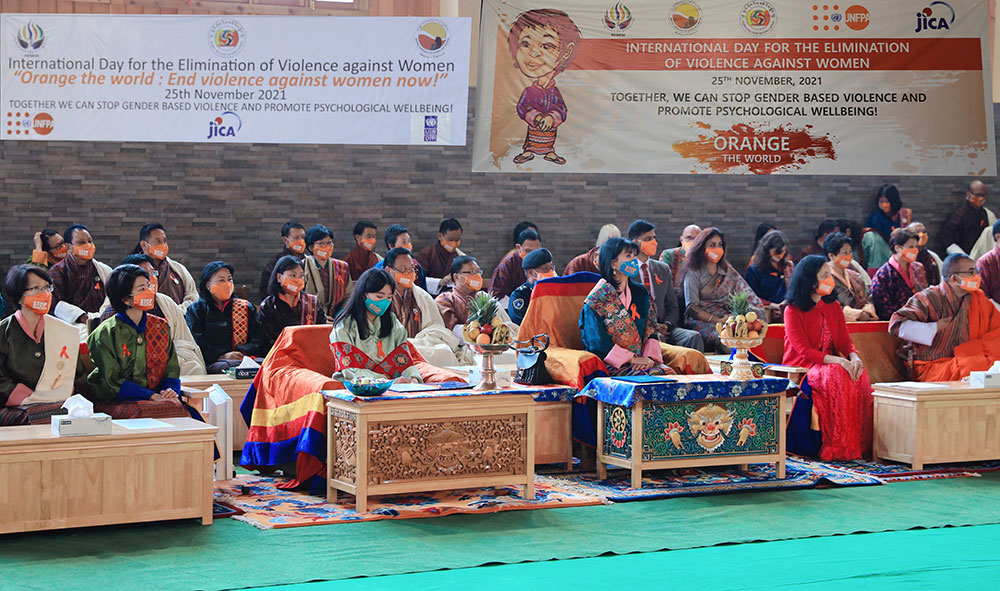Phub Dem | Paro
Gender-based violence in the country rose by 53.5 percent during the pandemic in comparison to 36.6 percent last year, according to records maintained by a non-governmental organisation, Respect, Educate, Nurture, and Empower Women (RENEW).
The organisation reported 751 gender-based violence cases as of November this year.
This was shared at an event to mark the International Day for the Elimination of Violence Against Women in Paro College of Education yesterday.
Royal Patron of RENEW, Her Majesty the Queen Mother Sangay Choden Wangchuck was the chief guest at the event. Her Royal Highness Princess Eeuphelma Choden Wangchuck, national and international dignitaries attended the event.
Her Majesty the Gyalyum highlighted preventing violence against women and girls as a shared responsibility that requires a community-based, multi-pronged, sustained engagement with multiple stakeholders. “If left unaddressed, the existing crisis of gender-based violence and domestic violence is likely to worsen with multiple impacts on our health and well-being.”
Her Majesty called upon the government, civil society and international organisations to invest in comprehensive, equitable and inclusive approaches to gender-based violence, adapted to rapidly changing contexts. “The unique needs of older women, women with disabilities and the LGBTQ plus community who are more susceptible to violence must be taken care of.”
Her Majesty launched RENEW’s video clip on engaging men and boys in promoting gender equality, audiovisual ‘Nga Chay gi Bay Tsup’ (We can do it), PCE and UNFPA’s sexual harassment prevention policy and an e-module on comprehensive sexuality education.
Her Majesty also launched the National Commission for Women and Children’s impact assessment report of Covid-19 on women and children.
While the spread and mortality due to Covid-19 in the country has been minimal, its impact on the economy and society has been enormous, according to impact assessment.
The findings revealed that 0.2 percent of children had married, compelled by certain situations, and the proportion was higher among girls in rural areas. Similarly, 0.4 percent of children had sexual encounters during the lockdown, higher among urban females. Little less than 0.2 percent of children have become pregnant since the outbreak of the pandemic.
It was also found that more than half of children (58.7 percent) engaged in paid work to supplement their family income and meet their expenses during the pandemic. The proportion of those who engaged in productive work was higher for male children. Twenty-seven children worked at construction sites.
Around six percent of adults reported experiencing one or more forms of Gender-based Violence (GBV), with most of them experiencing emotional and economic violence. The percentage of women experiencing GBV is noted to be slightly higher in women.
Besides, around five percent of children reported experiencing one or more forms of violence against children, with most of them experiencing emotional violence. Girls reported experiencing slighter higher incidents of violence.
However, the findings revealed that the majority of those who experienced GBV did not report to anyone.
Most of them were unaware of service providers’ helpline numbers or contact details, with a slightly higher proportion of men aware of these details than women. The report states that most of the respondents reported using the helplines to seek support if the confidentiality of information shared is maintained.
The assessment proposed recommendations including NCWC to facilitate programs to reduce women’s burden of unpaid care work, education ministry to strengthen the current education in emergency strategies and guidelines, and scale-up integration of GBV primary prevention interventions in schools. It recommended NCWC and relevant agencies to enhance services for survivors of GBV and violence against children.
To increase the efficiency of service provision for women and children in need of care and protection, NCWC launched a mobile application. The app is expected to provide easy access and convenient communication to the survivors of GBV and other forms of violence to seek immediate intervention.
Besides, the event also witness the launch of Druk Global Positioning System’s GPS application ‘Druk GPS’ recognised as a life saving technology.
The year’s global theme is “Orange the World: End violence against women now!” Bhutan observed the local theme ‘Together we can end gender-based violence and promote psychological well-being.’
The event was organised by PCE in collaboration with NCWC and RENEW with support from the UNFPA, UNDP and JICA.
Edited by Tshering Palden


